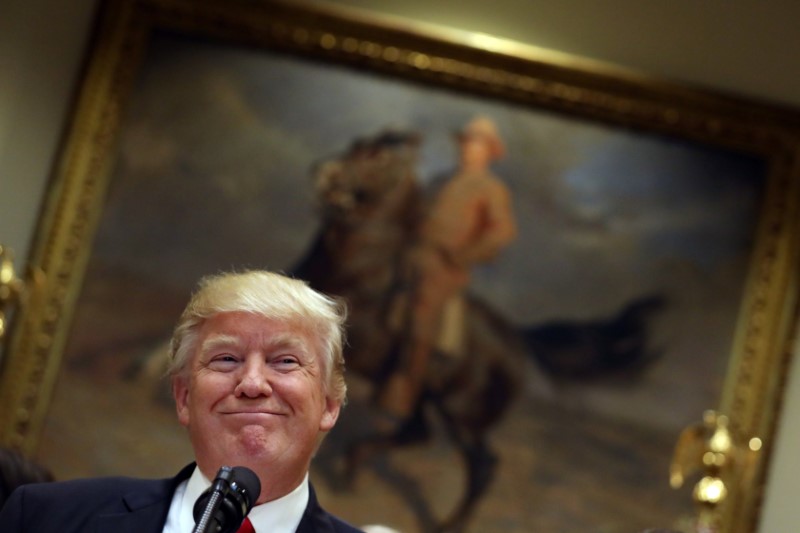By Richard Leong
NEW YORK (Reuters) - So much for Trumpflation.
The U.S. bond market is signaling investors have scaled back their outlook for an inflation pickup as skepticism sets in about whether President Donald Trump will be able to deliver on pledges for major tax reform and an infrastructure spending binge.
With Trump's presidency approaching its 100-day milestone, the bond market's barometer on investors' inflation view, the yield difference between Treasury Inflation Protected Securities and regular U.S. government bonds, has fallen and remains stuck near its lowest level this year even as U.S. stocks hang near record highs.
The pullback in TIPS inflation "breakeven" rates, along with falling Treasury yields and a flatter yield curve, are symptoms of a broad retreat of the "Trumpflation" or "reflation" trade in the bond market, analysts said. One measure of inflation expectations favored by the Federal Reserve has plunged below the critical 2 percent threshold in the last two weeks to its lowest level since the election.
"The reflation trade has really stalled since the beginning of the year. It really accelerated (lower) after the failure of healthcare reform," said Steve Kang, Citi's interest rate strategist in New York.
When Donald Trump captured the White House in November, traders bet on a surge in federal borrowing and inflation from the perceived pro-growth policies pledged during his campaign being quickly enacted by a Republican-controlled U.S. Congress. TIPS breakeven rates jumped, peaking at their highest in more than two years in February with investors piling into TIPS funds.
Since the failure to repeal and replace the Affordable Care Act, known as Obamacare, in March, doubts have grown about the possibility of tax cuts and infrastructure spending going into effect in 2017. (For a graphic on U.S. inflation, click http://tmsnrt.rs/2p8sVpu)
TAX PLAN FIZZLES
Not even this week's introduction of Trump's long-promised tax overhaul proposal was enough to reverse the recent tide.
Investors saw the statement of broad principles from Treasury Secretary Steve Mnuchin on Wednesday as short on details and facing a long road to enactment. Yields for long-dated Treasuries, those most susceptible to inflation risks, fell.
TIPS <.BCUSTIPS> have earned a total return of 0.23 percent so far in April, lagging the 0.56 percent for regular Treasuries <.BCUSATSY>, according to indexes compiled by Bloomberg and Barclays (LON:BARC). So far this year, TIPS have produced a 1.45 percent return, slightly ahead of 1.24 percent for regular Treasuries.
Mutual funds and exchange-traded funds that focus on TIPS have lost a bit of luster. They shed $66.28 million in assets to $61.82 billion in the week ended April 19, the first weekly drop since the week of Dec. 7, according to Thomson Reuters unit Lipper.
TIPS fund assets still totaled $5 billion more than the end of 2016, near a record.
CPI FALLS SHORT
Tempered expectations for the size and speed of delivery of Trump's policy slate is not the only factor. A surprise drop in the Consumer Price Index, which TIPS are benchmarked against, for March snapped 12 months of increases and was particularly alarming to investors.
Following that data, released in mid-April, the 5-year, 5-year forward breakeven rate, a measure of long-term inflation expectations watched closely by the Fed, plunged more than 30 basis points to 1.88 percent, giving back all of its gains since Election Day. It has since recovered a bit to 1.97 percent.
(For a graphic on breakeven rates, see: http://tmsnrt.rs/2oQC1o0)
Still, a number of investors remain confident the underlying inflation trend is favorable for TIPS, especially with modest economic improvement in Europe and stabilized growth in China.
"The cyclical upthrust in inflation is here to stay. Breakevens are well supported here," said Gemma Wright-Casparius, who runs Vanguard's $26.8 billion TIPS mutual fund, the largest of its kind, in Malvern, Pennsylvania.
Some saw the recent decline in TIPS breakeven rates as inevitable given the steep rise following Trump's victory.
"The correction we have seen is justified given how much we have seen during the run-up," said Shyam Rajan, head of U.S. rates strategy at Bank of America Merrill Lynch (NYSE:BAC) in New York.
Still, as turning campaign pledges into actual policy proves a greater challenge for the Trump administration than many investors had anticipated, others are resetting their expectations.

"As Trump proves more and more impotent, the stimulus packages the market hoped would push risk assets, tax reform, infrastructure (spending) and etcetera don't seem as realistic as they did on Election Day," said Keith Price, managing partner at KPW Partners in London.